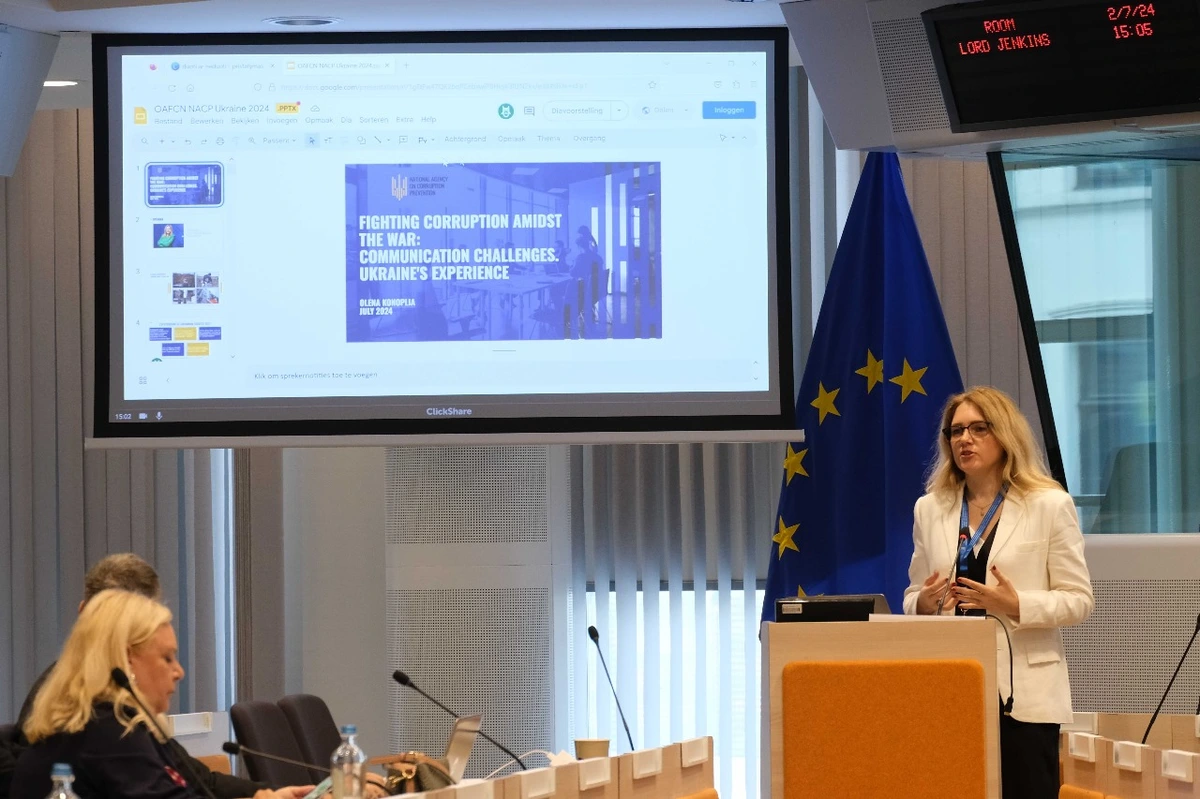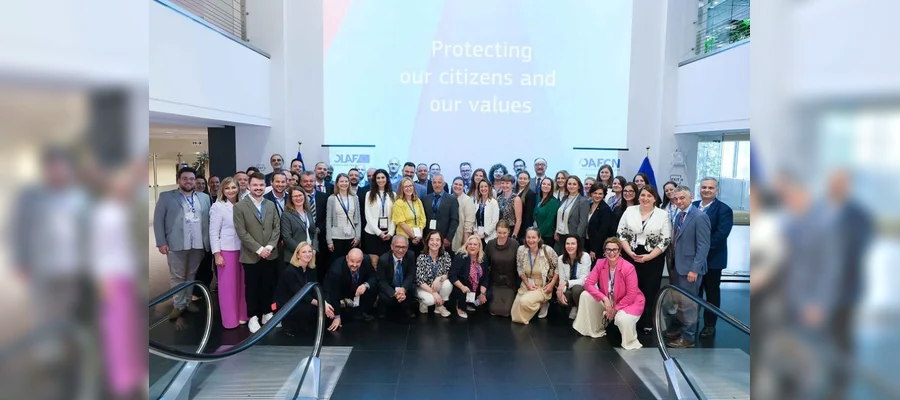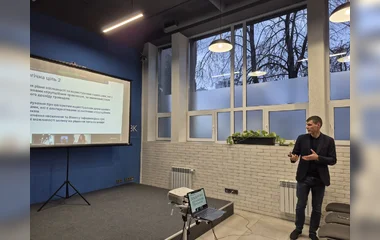At the invitation of OLAF (The European Anti-Fraud Office), Olena Konoplia, Head of the Communications and Information Policy Department of the National Agency on Corruption Prevention (NACP), presented Ukrainian experience in developing a Communication Strategy for Preventing and Combating Corruption, as well as information campaigns, research and other activities within the framework of the Strategy at the annual conference of communication specialists.
The 33rd annual meeting of communicators from law enforcement and anti-corruption agencies of the European Union OLAF Anti-Fraud Communicators Network (OAFCN), which aims to unite efforts in the fight against fraud and corruption and share best practices, brought together more than 50 communication specialists from national authorities of different countries. OLAF Director General Vill Itälä emphasized the importance of the network of communicators: "They play a very important role in informing citizens about actions that protect them, their money and society. By sharing knowledge and aligning strategies, OAFCN members can ensure that these messages reach everyone. This meeting underscores our commitment to transparency and will result in even more robust and effective awareness campaigns."
During the conference, participants had the opportunity to explore and discuss the use of artificial intelligence in communication, get an overview of existing tools and discuss the benefits and risks of using them for communication and public engagement. Participants presented campaigns already conducted in their countries and upcoming campaigns focusing on anti-fraud, anti-money laundering and anti-corruption messages. A representative of the NACP was invited as a special guest from a country that is not yet a member of the European Union, but whose situation is of concern to all members of the network. Olena Konoplia spoke about the expectations of Ukrainian society, sociological research data, the focus of anti-corruption agencies, the country's successes and challenges in this area, and planned actions.
"We want to make the most of the historical moment we are in now. The war in Ukraine has been going on for three years now, caused by russia's full-scale invasion. The minds of our citizens have undergone dramatic worldview changes that would not have been possible if not for this trial we are going through now. The war has made us think about things that many of us had not thought about before, and it has made us make a choice - not only about supporting our country, but also about all the world's foundations in general: the European democratic community or the dark autocratic "russian world." Now is the time to build a new one, finally getting rid of the burdensome Soviet legacy. And this applies not only to the Soviet coal-fired power plants bombed by the russians, which we will replace with new, mobile, and environmentally friendly ones. It's time to get rid of old Soviet habits, too, and corruption in Ukraine is largely a legacy of the Soviet Union and is not historically inherent in Ukrainians. This is where one of our campaign slogans came from: "Corruption is not a legacy". We want to get rid of it so that we do not pass this legacy on to our children," said Olena Konoplia.
For the first time in 10 years, Ukraine has demonstrated the biggest jump in the global Corruption Perceptions Index (CPI), receiving 36 points out of 100 in 2023 and ranking 104th among 180 countries instead of 142nd in 2014. According to this indicator, Ukraine has one of the best results in the world in 2023. This result was facilitated by the work of anti-corruption agencies, the resumption of the declaration od\f assets of public officials last year, which is one of the most demanding in the world, the adoption of the State Anti-Corruption Program, the launch of the Whistleblower Portal, the introduction of a large number of digital services and other measures. All of these steps have yielded results that should be strengthened and multiplied in the future.
However, Ukraine has many problems and challenges along the way, such as an under-reformed judicial system and many corruption loopholes in the most problematic areas, such as customs or the sale of large infrastructure projects. Ukraine has not achieved full inevitability of punishment, and at the same time, it has not yet built a powerful system of corruption prevention. As a result, there is a lack of public understanding of positive changes and a lack of awareness of their consequences. Against the backdrop of constant high-profile revelations, citizens have a strong impression that corruption in Ukraine is insurmountable. The narrative that Ukraine is totally corrupt is the most successful narrative of russian disinformation, and it is spread not only inside Ukraine but also outside, each time preceding our partners' decision to provide another aid to Ukraine.
Another challenge is the difficulty of the authorities in communicating their anti-corruption efforts and the lack of a unified voice and coordination of the state information policy in this area.
Given this situation, the communication team of the NACP and partners began its work by creating a Communication Strategy, which the Government approved at the end of last year. The peculiarity of the Strategy is that no public funds will be spent on its activities. The strategy is based on data from sociological and analytical studies, including annual surveys of the population and business, media research, and disinformation narratives. The NACP has already united and coordinated the community of state communicators as part of the policy of a single voice in the field of anti-corruption. Its main activities include a series of nationwide information campaigns that will last until the end of 2025.
The information campaigns, which Ukrainians will soon see, will focus on public control over the government, the use of digital services as corruption prevention, explaining the work of anti-corruption agencies, popularizing corruption whistleblowing, promoting good behavior among target groups, including public officials, promoting convenient services that are an alternative to corrupt practices, etc. Most of the campaigns will be implemented by the NACP together with its partners - the Ministry of Digital Transformation, the National Civil Service Agency, other ministries and agencies, as well as international and Ukrainian non-governmental organizations.
The goal of all these activities is to increase the understanding of Ukrainian citizens of the link between anti-corruption measures and the impact on national security, economic growth and welfare; reduce the overall level of tolerance to corruption; increase the share of Ukrainian citizens who have a negative attitude to corruption and are willing to report corruption; and reduce the share of those who have had their own corruption experience.
The OAFCN leadership and members offered Ukraine their full support in implementing this complex and challenging work. Many representatives of other countries noted that their societies and authorities have also been on this path and are ready to share their experience of successful projects and lessons learned.
For reference.
The OAFCN was established in 2001 and is a unique European network of communications experts working on anti-fraud issues. The network brings together communications specialists and spokespersons from OLAF's operational partners in Member States (i.e. customs, police, law enforcement, the Anti-Fraud Coordination Office of the Member States (AFCOS) and prosecutors) and plays a key role in informing the public about the threat of fraud in all EU Member States and the joint efforts of national and European authorities to combat it. It is a key platform for raising awareness and reaching different audiences on fraud issues.
OLAF's mission is to detect, investigate and stop fraud involving EU funds.












